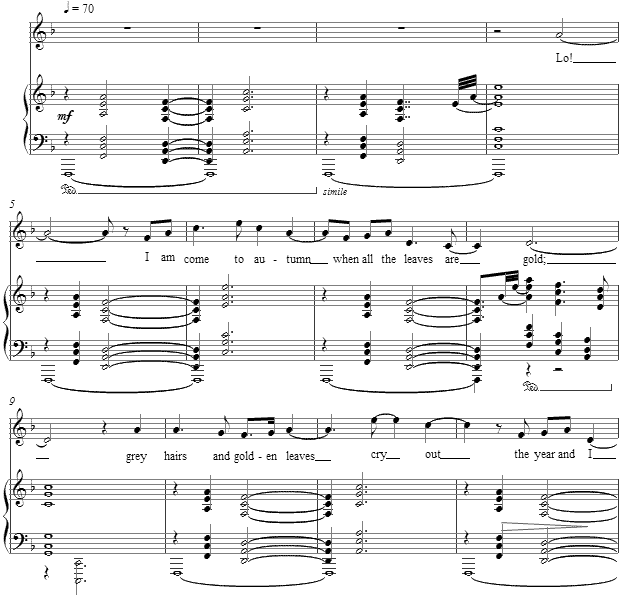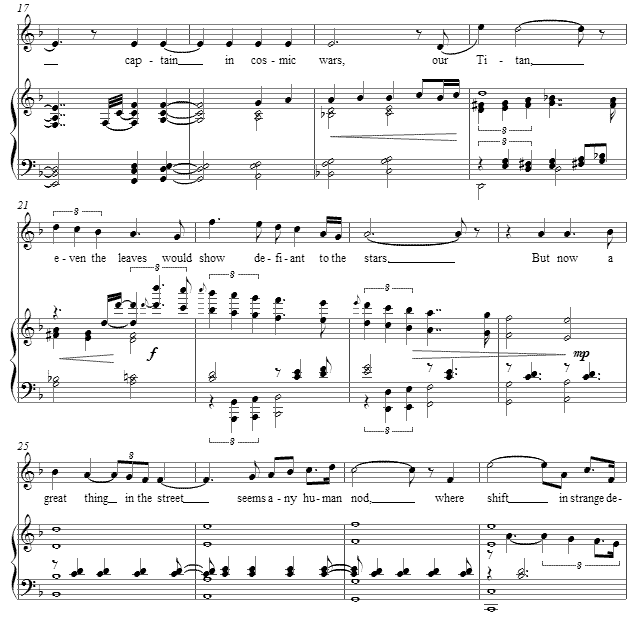Music and Texts of GARY BACHLUND
Vocal Music | Piano | Organ | Chamber Music | Orchestral | Articles and Commentary | Poems and Stories | Miscellany | FAQs
Gold Leaves - (2008)

G. K. Chesterton
for high or medium voice and piano
Lo! I am come to autumn,
When all the leaves are gold;
Grey hairs and golden leaves cry out
The year and I are old.
In youth I sought the prince of men,
Captain in cosmic wars,
Our Titan, even the weeds would show
Defiant, to the stars.
But now a great thing in the street
Seems any human nod,
Where shift in strange democracy
The million masks of God.
In youth I sought the golden flower
Hidden in wood or wold, [ 1 ]
But I am come to autumn,
When all the leaves are gold.[ 3 pages, circa 3' 00" ]
G. K. Chesterton
This marvelous text compares youth with age, wedding metaphoric images of autumn and spring, though spring is not specifically mentioned. It was published in an early collection, The Wild Knight & Other Poems (1900). In the poem, youth is seen as that time when one seeks the single "hidden" notion -- "the golden flower" -- to the exclusion of "all the leaves" of gold. Chesterton contrasts seeking the single golden flower to perceiving an entire forest ablaze with autumnal colors.
One of the great secrets of growing wisdom is to discern that the "captain in cosmic wars" and "titan" of our youthful exuberance is a folly, for with wisdom comes the realization that we all can be equal captains and equal titans in those "cosmic wars." This egalitarian notion is upsetting to those who would lead by coercive force for what they would define as the social "good," but comforting to those who would not be coerced by such a merely human force.
Chesterton was, of course, quite the comic as well as philosopher, and suggested, "The word 'good' has many meanings. For example, if a man were to shoot his grandmother at a range of five hundred yards, I should call him a good shot, but not necessarily a good man." In this regard, I prefer not to be told by others what is to be my definition of the common "good." It is most interesting to note that a great deal of the discussion is about the "common good," but when one looks to have the term defined, one finds too many political activists unable and perhaps unwilling to clarify the word's meaning, though such activists and politicians are certain to portray themselves as the elite "captain in cosmic war" and as the better-informed and visionary "titan" to the masses' lesser stature and status. For this, Chesterton ends his third stanza with the notion that there is a strange democracy to the whole image, wherein the singular titan is made just "any human nod" by the "million masks of God."
tessitura in the high edition
The setting follows a song form - A-B-A plan. The opening chord successions indicate a two-measure period, over which lies a longer lined vocal line which spans almost the entire vocal tessitura of the setting.
A center section moves from the clear emphasis on the tonic to the seemingly brighter submediant, if only for a moment of contrast and dramaturgical reflection to that time of youth which Chesterton names twice in the second and last stanzas of his poem. Alongside the tonal region shifting temporarily and the wider spread of pianistic colors and dynamics, there is an emphasis on triplets as another contrast to make the underlying duple seem a more reserved, somber tonic region.
The score to Gold Leaves is available as a free PDF download, though any major commercial performance or recording of the work is prohibited without prior arrangement with the composer. Click on the graphic below for this piano-vocal score.
Gold Leaves - edition for high voice
tessitura for low voice
Gold Leaves - edition for low voice
NOTES
[ 1 ] Wold - This word is mostly used as a literary device, though it finds its way into older English names, such as the Cotswold with its Forest of Dean in Gloucestershire, United Kingdom. Its meaning is sometimes given as "a tract of open rolling country, especially upland, and is linguistically taken from the Old English weald, or bush, and is related to the Old Saxon wald, the modern German word, Wald, for forest.


